Muslims constitute 20% of UP's electorate.
Currently, Muslim voters are divided between Akhilesh's SP and Mayawati's BSP.
What will tilt the balance?
Can Muslims back the winning party?
Mohammad Sajjad explains the mysteries of UP's Muslim politics.
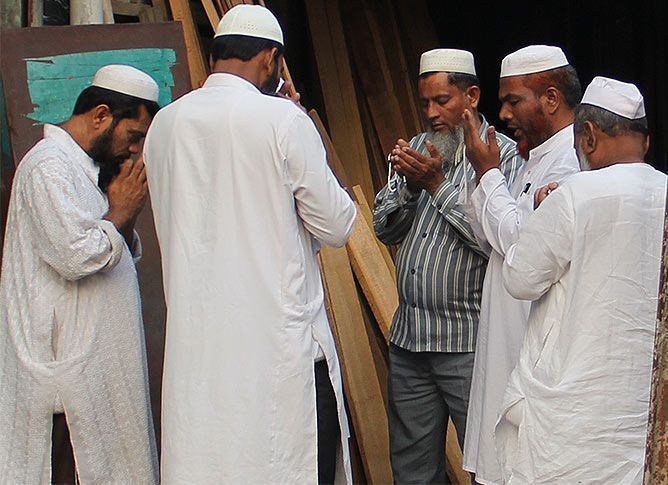
In the centre is Mohammed Naeem, one of the survivors from the 1987 massacre.
Photograph: Uttam Ghosh/Rediff.com
Indian elections are more about the equations of social engineering.
Hence in this election for the Uttar Pradesh assembly, a question is: Which way will the Muslims vote? Muslims constitute around 20% of UP's electorate.
By and large, the bulk of the Muslim electorates remains divided between Akhilesh Yadav's Samajwadi Party and Mayawati's Bahujan Samaj Party. Even though, some smaller players like Asaduddin Owaisi have also jumped into the fray.
In this hate-filled era of majoritarian consolidation, there are certain issues of minorities which are left only for the likes of Owaisi to be articulated, rather than by the 'secular' parties.
In recent years, Dr Aiyub Ansari, (born in Gorakhpur and an alumnus of the Benares Hindu University) has also been trying his luck through his outfit, the Peace Party of India. Gorakhpur in eastern Uttar Pradesh is a major centre of Hindu chauvinists like Yogi Adityanath.
While Akhilesh has the disadvantages of anti-incumbency factors -- more specifically, his government's very bad performance on law and order (Goonda Raj), complicity in communalisation, failure in preventing and controlling the communal riots and huge displacements of the riot victims, infighting within the family -- he also has some advantages like large scale road construction, patronage in awarding contracts to such constructions, welfare schemes and freebies.
Akhilesh has been almost mute on the demonetaisation which hit the poor (and lower middle classes) hardest.
His father Mulayam Singh Yadav's proximity with the Bharatiya Janata Party have remained no secret. He has been silent on falsely framed terror charges against Muslim youth.
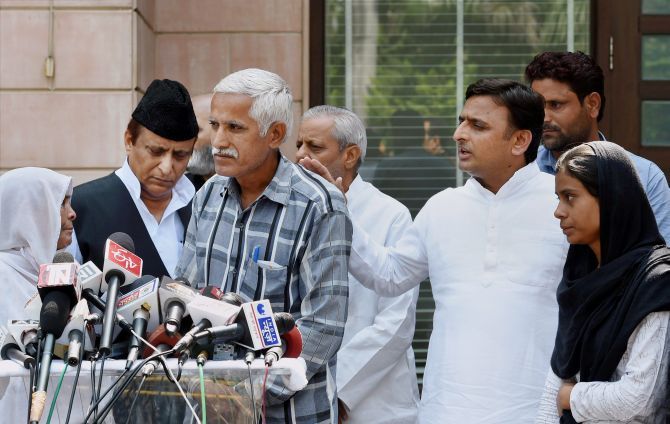
Against this, Mayawati's track record on governance and law and order (Kanoon Ka Raj) has been very good, particularly during her term as chief minister between 2007 and 2012. She spoke stridently against the BJP's demonetisation.
The only argument the articulate segment of Muslims put forward against Mayawati is that she aligned with the BJP in the past. This is an argument the other segments of Muslims, who form the bulk of the community, don't seem to buy much. Why?
Because, in India's electoral history, there is hardly any non-Congress political formation which did not align, directly or indirectly, with the BJP's parent, the Bharatiya Jan Sangh or the BJP at one or the other point of time!
Against this backdrop, therefore, it would be apt to have a look at UP's political history.
About the Muslims of UP, it is understood that compared to most other provinces, they have relatively higher economic standards, more widespread education and greater political articulation.
They have always played a leading role in the political life of Indian Muslims.
With this self consciousness, after India's independence in 1947, it was on August 8-9, 1964 in Lucknow when the first attempt was made to form a pressure group (not a political party) of Muslims to take the community out of its slumber and frustrations in the wake of the communal violence of the early 1960s.
Various ideologically incompatible groups of Muslims got together to form the Muslim Majlis-e-Mashawarat. It played a considerable role in 'politicising Muslim electorates, in acquainting them with some of the fundamental political issues involved, and in detouring them from their support for the ruling Congress.'
'Thus, the Muslims came into contact with other political leaders and parties and actively worked for their success.'
Dr Mohammad Abdul Jalil Faridi was among the most prominent politicians in this exercise, who from the platform of the Mushawarat, articulated and asserted the issues concerning the Muslims in the general election of 1967.
Though Dr Faridi soon split away from the Mushawarat and formed the Muslim Majlis in 1968, in 1969 it elected its lone MLA, Habib Ahmad, from Allahabad.
Dr Faridi's protégé Mohammad Ilyas Azmi articulated his political vision in an Urdu booklet, Musalmanon Ki Siyasat: Zakhm aur Ilaj (Muslim Politics: The Wounds/Ailments, and its Cure, June 1995).
Though inspired by Allama Iqbal and Maulana Maududi, Ilyas Azmi played a vital role in advocating electoral unity (not much for unity on the social front) between the Muslims, Dalits and Backwards, with an unambiguous anti-Congress-ism.
In his anti-Brahmin rhetoric, however, the intra-community subordination of the communities of Muslims is conspicuously missing in the booklet.
Ilyas Azmi is said to have often charted out his own independent courses of politics on many issues.
For instance, when the Muslims were sceptical about the Jayaprakash Narayan movement of 1974 because of its affiliation with the Rashtriya Swayamsevak Sangh, it was Azmi who advocated supporting JP's movement.
This, despite an altercation between Dr Faridi and JP the previous day.
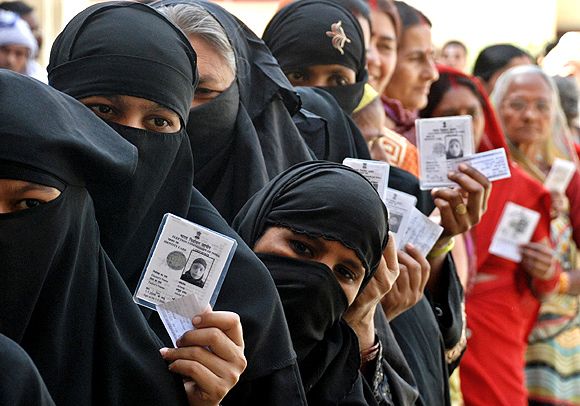
Ilyas Azmi was also behind the campaign to dissolve the Provincial Armed Constabulary, UP's paramilitary who was infamous for anti-Muslim partisan roles in the communal violence, most horribly in the 1987 massacre of Hashimpura, Meerut), and to form an 'anti-riot force' instead.
In February 1986, after the locks of the Babri Masjid were opened by the Congress government, giving birth to the Babri Masjid Action Committee, it was Azmi who came out with the idea of insisting on two demands: Status quo for all places of worship as these existed on the day of Independence, August 15, 1947, and that all the cases of the Babri Masjid should be given away to a high court bench comprising non-Hindu and non-Muslim judges.
Further, he is said to have written several articles dissuading India's Muslims against their emotional support to Saddam Hussain.
Ilyas Azmi ended up joining the BSP and was elected twice to the Lok Sabha, in 2004 and 2009. He joined and then quit the Aam Aadmi Party in 2016. In his 80s, reportedly ailing, he seems to have gone into political oblivion without having nurtured a set of leaders to succeed him.
So is the case with another leader, Shafiqur Rahman Barq. A graduate from Agra university, he represented Sambhal four times -- in the 11th, 12th, 14th and 15th Lok Sabhas. In 2014, from the BSP, he switched over to the SP, and re-contested the election, but lost to the BJP. Now, in his late 80s, he too seems to have gone into oblivion.
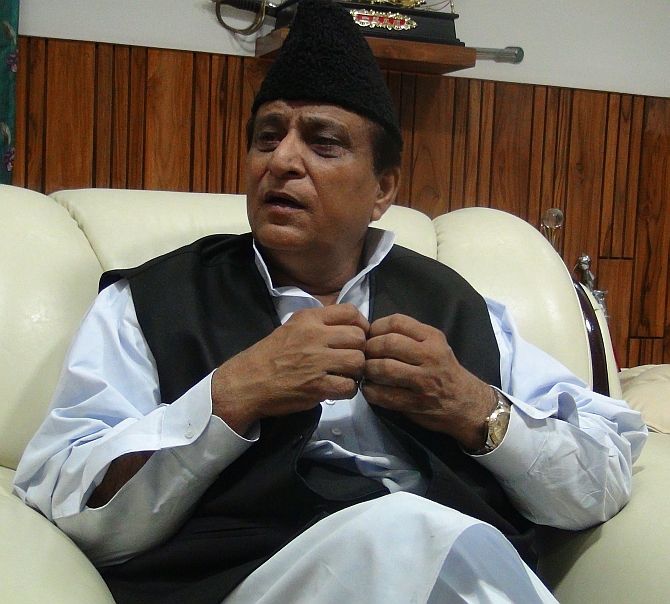
Azam Khan of Rampur is a formidable politician who has consistently been with the SP. Starting his political career with the Students Union at the Aligarh Muslim University, he rose to prominence and became minister with many portfolios.
In recent times he has become known for courting controversies by communally divisive and fanatic utterances. In the capacity of minister in-charge, Muzaffarnagar affairs, he stood 'helpless' while Muzaffarnagar and adjoining districts suffered from the worst-ever communal violence and displacements in 2013.
With the riots, he seems to have earned a lot of discredit, disrepute and ignominy. To perpetuate his dynasty -- wife sent to the Rajya Sabha, his son is now contesting the assembly election -- Azam Khan has not allowed other political leaders to emerge in Rampur.
Ironically, he rose in politics by standing up to the Nawabs of Rampur, who remains with the Congress.
In Western Uttar Pradesh, consequent upon the socio-economic changes, some new social groups are throwing political leaders.
The community of Qureshis (butchers) have exhibited their political aspirations in recent decades.
This manifested perhaps first in Aligarh, where the Qureshis and the Saifis (carpenters) arguably remain political rivals against each other. This aspect awaits deeper exploration. A similar phenomenon is noticeable in other parts of western Uttar Pradesh.
According to a recent study (2010), of Meerut, by Bruno de Cordier: 'Both Qureshi(s) and Ansari(s) continue to dominate the social geography of the Muslim parts of Meerut. Many Qureshi, who are a minority, still occupy their traditional professional niche, in part because of the absence of Hindu and Jain presence in the butchery sector due to cultural reluctance or abstinence from meat in these communities.'
'Two of Meerut's large meat companies, Al-Faheem Meatex and Al-Saqib Exports, export halal meat to the Gulf and Russia amongst others, and are owned by prominent Qureshis like Yakub Qureshi -- who is colloquially known as 'Haji Yakub' and lives in a mansion in his original neighbourhood -- and former Meerut mayor Shahid Akhlaq.'
'Both are closely connected to the Deobandi movement and have been elected into the state and federal assemblies with the Bahujan Samaj Party (BSP), a political party that emerged from the Dalit emancipation movement and is now the ruling party in Uttar Pradesh.'
'This nexus between prominent Qureshi meat entrepreneurs and their extended families, the Deobandi movement and the BSP forms a controversial patronage network that determines the political dynamics of Meerut and of its Muslim parts in particular.'
'The more numerous Ansari, for their part, tend to have more professional diversity these days. Although this community generally tends to attach more importance to education as a channel of social mobility than the Qureshi, it has less economic clout than the latter.'
'The size and style of some of the houses in the mohallas indicate that despite the poverty, there are also pockets with money and individual success stories, especially among Qureshi who dominate the meat business.'
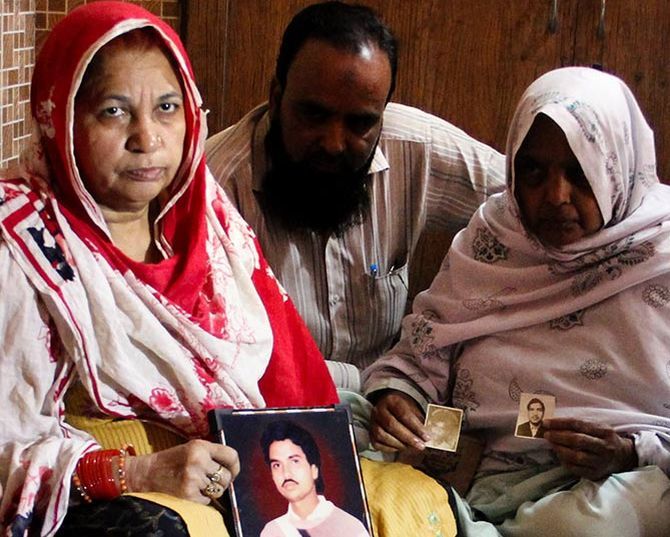
Zarina, right, who never speaks, with photographs of her husband and son.
Both father and son were killed in Hashimpura in 1987.
Photograph: Uttam Ghosh/Rediff.com
Thus, more recently, Yaqub Qureshi, the meat entrepreneur, with a dozen meat factories in Meerut, Moradabad and Saharanpur, and meat exporting firm, formed his own political outfit in 2007, the Uttar Pradesh United Democratic Front (UPUDF), and was elected from the Meerut assembly seat in 2007.
The BSP formed its government in 2007, and Yaqub Qureishi merged his UPUDF with the BSP in September 2007.
In 2012, when the BSP denied him a ticket, he joined Ajit Singh's Rashtriya Lok Dal, but lost the 2012 assembly election.
In 2014 he re-joined the BSP and contested the Lok Sabha elections from Moradabad, but lost.
In 2017, he, and his son, Imran Qureshi, are contesting on two different assembly seats of Meerut on the BSP symbol.
He, however, pursues his politics more on utterances like announcing rewards for those who could behead the Danish cartoonists (2006) and Charlie Hebdo staff (2015) who showed disrespect to the Prophet Mohammad.
Interestingly, Yaqub Qureshi (as well as Dr Aiyub Ansari of the Peace Party) does not champion the Pasmanda cause, the way Dr Ejaz Ali, and Ali Anwar Ansari have been doing quite assertively in Bihar since the 1990s.
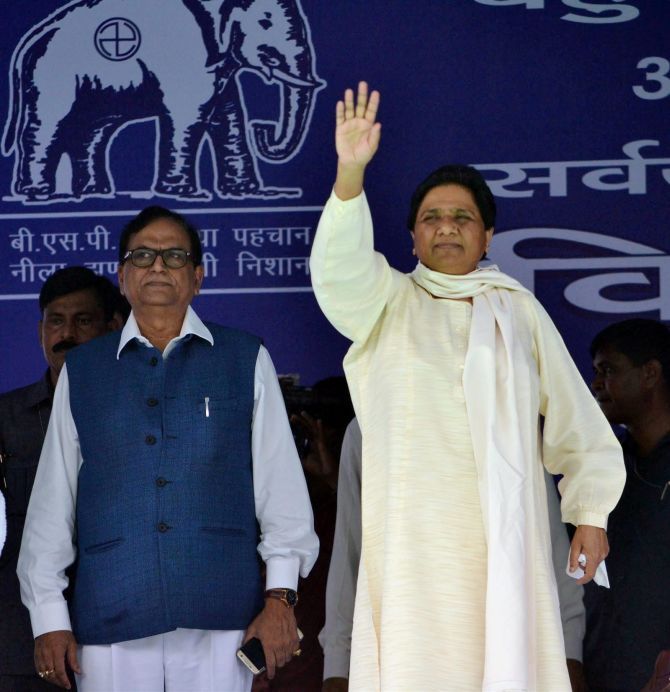
So much so, that even when the Muzaffarnagar riots of August-September 2013 took place, only after the mobilisation of the Pasmanda Kranti Abhiyan began in this locality and in Pedda, Bijnor -- the victims were Muslim dhobis (washermen) -- the likes of Yaqub Qureishi chose not to articulate their politics along these lines.
This looks interesting as well as intriguing for the fact that the BSP's bête noire, the incumbent ruling Samajwadi Party, stands badly accused for not having controlled either the riot or a huge displacement of poor Pasmanda Muslims.
Even though some of the Pasmanda intellectuals and activists have been showing their inclination more towards the BSP, as compared to the SP, the articulate segments of Muslims seem to be inclined more towards the SP.
With this divergence, it is surmised that the BJP may have better prospects if it succeeds in attracting the lower backwards, which, in Bihar, is known as the Most Backward Classes, MBCs.
In 2001, when Rajnath Singh of the BJP (currently the Union home minister) was the chief minister of UP, he, in order to woo the MBCs, had tried to split the reservations (protective discrimination) for the OBCs into two, just as it is there in Bihar since 1978. Bihar Chief Minister Nitish Kumar, in 2006, extended these benefits down to the local bodies as well.
Rajnath Singh had appointed the Samajik Nyaya Samiti, under Hukum Singh (currently, the MP from Kairana, Muzaffarnagar). This was pre-empted by his cabinet colleague, Ashok Yadav, through the judicial route.
While girding up for the 2017 polls, even the BSP's Mayawati did not throw overtures to win over the MBCs, whereas the BJP has recruited several MBC leaders such as Swami Prasad Maurya and Babu Singh Kushwaha who have deserted the BSP.
The political aspiration of the MBCs is termed as the 'third democratic upsurge.' Quite an overwhelming proportion of the Muslim communities would fall into this category of MBCs.
Yet, the political parties vying for and thriving on the Muslim votes have chosen not to press the issue of splitting up the OBC bloc, as per the 'Bihar Model.'
Even more surprising is the fact that even the Muslim intelligentsia has hardly pressed much for it.
Nonetheless, quite a lot of the BSP's groundwork for Dalit-Muslim unity is reported to be underway.
These political workers are not oblivious of the 'third democratic upsurge.' The BSP therefore seems to be confident about its performance in 2017.
It therefore remains to be seen: a. if there would really be a manifestation of the 'third democratic upsurge' in the electoral outcome of 2017; b. if this upsurge would really penetrate the Muslims,; and c. will it be that the BJP would be ushering in the 'third democratic upsurge' with which the bulk of Muslims would stand benefitted?
This would indeed be an interesting development to watch.
Mohammad Sajjad, who teaches History at Aligarh Muslim University, is the author of Muslim Politics in Bihar: Changing Contours (Routledge, 2014) and Contesting Colonialism and Separatism (Primus, 2014).










